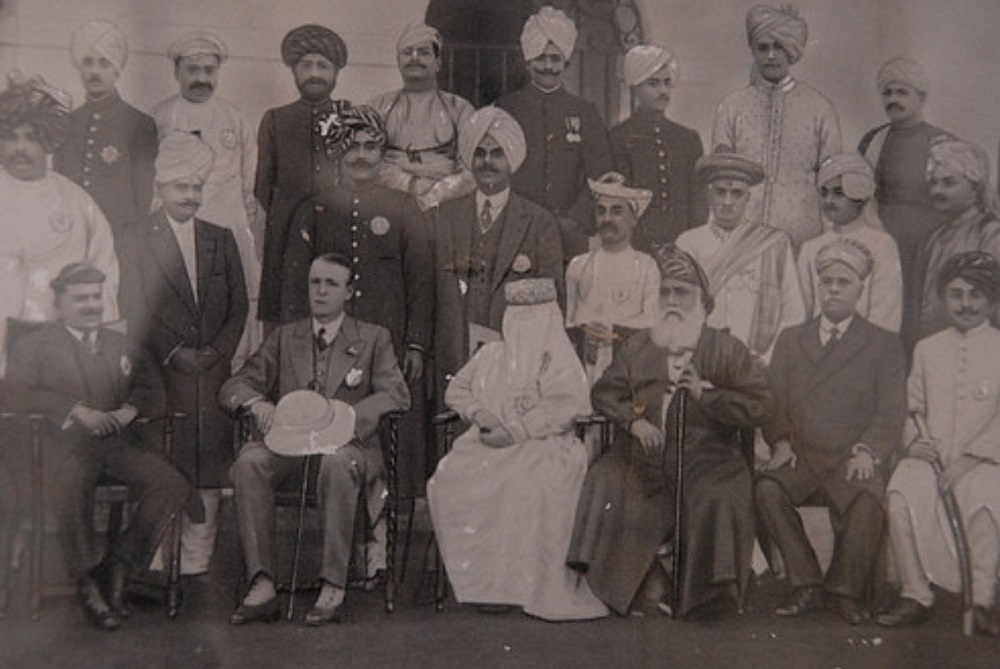Written by: Mahnaz Shujrah
Posted on: July 14, 2022 |  | 中文
| 中文
The Viceroy, Lord Minto, and the Vicereine with the Begum of Bhopal and her four grandsons in 1907
The Western dominated feminist narrative is such that it makes any indigenous movement or figure appear to be an outlier or a rupture. Feminism is not a modern concept, and neither is it solely a product of the developed world. One may find it hard to believe that a dynasty of women successively ruled a princely state in British India for more than a hundred years. Bhopal, one of the largest and most influential of these states, entitled to a 21-gun salute, was ruled by four consecutive Begums, between 1819 and 1926. The last of these Muslim female rulers was the remarkable personality of Begum Sultan Jahan.
Sultan Jahan was born in 1858 in Bhopal, a Princely State in central India. She was a philanthropist, an avid writer, an icon of women’s education and an overall progressive Muslim ruler. She had many accomplishments to her credit, including being the first female chancellor of Aligarh Muslim University and the first president of the All-India Conference on Education. She traveled widely; as a devout and practicing Muslim, she undertook to Makkah to perform Hajj; she traversed through many countries in Europe and attended the Coronation of King George V. Back home, her policies were community-focused and promoted the unique multicultural diversity within Bhopal. Aware of the vitality of public infrastructure, she worked ambitiously to set up a municipality system to bring about health reforms, sanitation and water supply to the people of Bhopal. She also constructed a Walled City and a palace for herself, built for practical purpose rather than wasteful extravagance that nawabs were often found indulging in.
Sultan Jahan did not appear in a vacuum, she was part of a legacy. The first was Qudsia Begum, who ruled from 1819 to 1837, and became the head of state when her husband died. She became a regent, securing the throne for her only heir, her fifteen-month-old daughter. She was a fearless woman and refused to be bound by the customary rules of purdah. She declared her daughter, Nawab Sikander Begum to be the next ruler. She was a strong ruler, who governed the state from 1844 to 1868. Dynamic and charismatic, Sikander Begum played polo and went tiger hunting, as was the tradition of the royal family. After her, Begum Shah Jahan governed the state from 1868 to 1901. Living up to her namesake, she built several outstanding structures in Bhopal, including the Taj Mahal Palace, Sardar Manzil and Taj ul Masjid. Sultan Jahan was fourth and last of the legendary ruling Begums of Bhopal. She came to the throne at the mature age of 43, a much older age than the other Begums, who were respectively of ages 19, 26 and 30 when they ascended the throne.

Begum Sultan Jahan leaving her London hotel while attending the coronation ceremony of King George V in 1911
Sultan Jahan, also referred to as Sarkar Amman by her grandchildren, was a headstrong and disciplined individual. Her great grandson, Shaharyar Khan, writes about her in his book: “Sultan Jahan’s personality was cast in steel. She was devout, just, tenacious and ascetic. Her early life had been hard, replete with personal tragedy and immense deprivation suffered at the hands of her mother and stepfather. It was Sultan Jahan’s gracious nature and traditional obedience that in her autobiography, she has nothing but praise and understanding for her mother.” Shaharyar Khan was the only son of Abida Sultaan, who was Sultan Jahan’s eldest granddaughter and the Heir Apparent after Nawab Hamidullah Khan. After Partition and the rift with her father, Abida Sultaan settled with her son in Pakistan. In her memoirs, Abida Sultaan writes in detail about her childhood under the strict watch of Sarkar Amman, and later reflects on the towering influence her grandmother had on her life, for which she was grateful. Shaharyar Khan aptly talks about this “Sultan Jahan was a visionary and modernizer who broke with tradition to have her son educated at a university. She educated her little daughter-in-law and her granddaughter so that they were not only seeped in the Quran and Hadith, but also learnt English, French and to play Chopin on the piano. The learning of martial arts for the girls – marksmanship, swimming, riding – was also an essential part of the role of complete woman Sultan Jahan has conceived for girls in her family.”
Education was the first and foremost priority for the Begum, for her family and her people alike. She understood the need for balance of both worldly and religious knowledge. She wrote approximately forty-one books on various topics during her life, including her autobiography “Gauhar-i-Iqbal”. She emphasized education for all, and there was a Sultan Jahan Endowment Trust, which provided tuition money for those unable to afford, but stressed on girls being given equal opportunity to study. In her own words she says “In my opinion, imperfect education is worse than none at all. Sweet waters of this spring should either be drunk deep or not tasted at all. It is a stupid thing to my mind, to teach the girls to read and write, and then leave them to their fate. The very least that should be done for them, is to give them a thorough grounding in things that matter, and to awaken the dormant soul in them”.

The Begum of Bhopal, Sultan Begum, with her office executives and the Viceroy of India, Lord Chelmsford, in 1921
One of the most well-known aspects of her reign was her selection of her third son, Nawab Hamidullah Khan as the Heir Apparent, despite her older two sons being alive at the time. This caused a deep rift in the family, and the issue turned into a long, drawn-out legal case in which the British rulers were against her, despite her pro-British leanings. She traveled all the way to England to present her case and was not willing to relent. After winning the case she abdicated, and Hamidullah Khan was coronated as head of the Bhopal State in 1926. Sultan Jahan passed away four years later, on 12th May 1930 and is buried on premises of Bhopal Sofia Masjid. With her ended the rule of the Begums, and with the Partition that followed, the world of the princely states and nawabs eventually collapsed, making way for a different way of life.
You may also like: